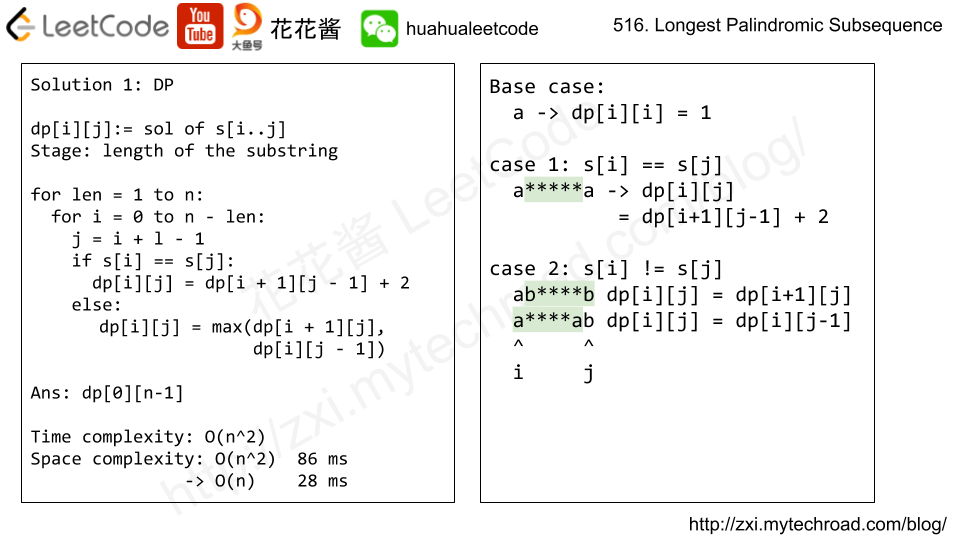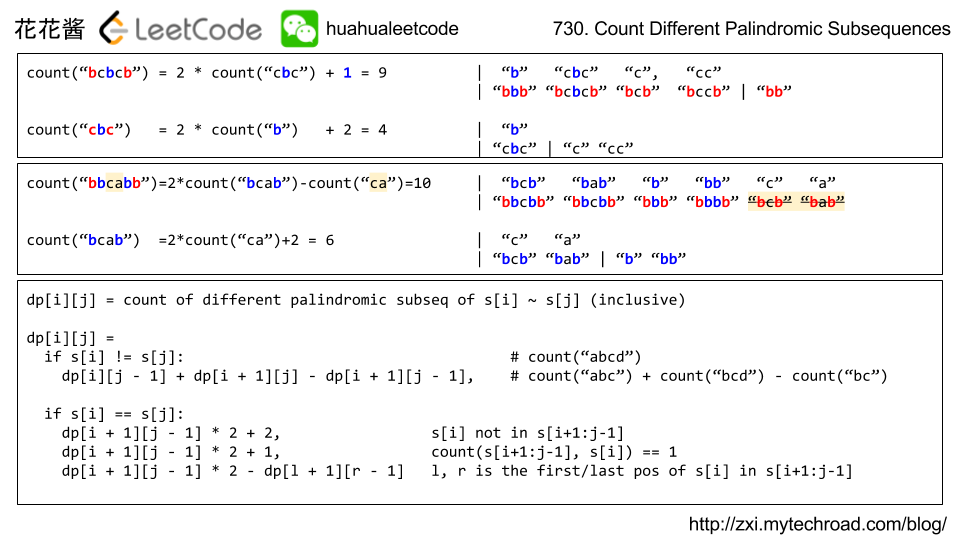VIDEO
Problem:
Given a string S, find the number of different non-empty palindromic subsequences in S, and return that number modulo 10^9 + 7.
A subsequence of a string S is obtained by deleting 0 or more characters from S.
A sequence is palindromic if it is equal to the sequence reversed.
Two sequences A_1, A_2, ... and B_1, B_2, ... are different if there is some i for which A_i != B_i.
Example 1:
Input:
S = 'bccb'
Output: 6
Explanation:
The 6 different non-empty palindromic subsequences are 'b', 'c', 'bb', 'cc', 'bcb', 'bccb'.
Note that 'bcb' is counted only once, even though it occurs twice.
Example 2:
Input:
S = 'abcdabcdabcdabcdabcdabcdabcdabcddcbadcbadcbadcbadcbadcbadcbadcba'
Output: 104860361
Explanation:
There are 3104860382 different non-empty palindromic subsequences, which is 104860361 modulo 10^9 + 7.
Note:
The length of S will be in the range [1, 1000].
Each character S[i] will be in the set {'a', 'b', 'c', 'd'}.
Idea:
DP
Solution 1: Recursion with memoization Time complexity: O(n^2)
C++
1
2
3
4
5
6
7
8
9
10
11
12
13
14
15
16
17
18
19
20
21
22
23
24
25
26
27
28
29
30
31
32
33
34
35
36
37
38
39
40
41
// Author: Huahua
// Runtime: 72 ms
class Solution {
public :
int countPalindromicSubsequences ( const string & S ) {
const int n = S . length ( ) ;
m_ = vector < vector < int >> ( n + 1 , vector < int > ( n + 1 , 0 ) ) ;
return count ( S , 0 , S . length ( ) - 1 ) ;
}
private :
static constexpr long kMod = 1000000007 ;
long count ( const string & S , int s , int e ) {
if ( s > e ) return 0 ;
if ( s == e ) return 1 ;
if ( m_ [ s ] [ e ] > 0 ) return m_ [ s ] [ e ] ;
long ans = 0 ;
if ( S [ s ] == S [ e ] ) {
int l = s + 1 ;
int r = e - 1 ;
while ( l <= r && S [ l ] != S [ s ] ) ++ l ;
while ( l <= r && S [ r ] != S [ s ] ) -- r ;
if ( l > r )
ans = count ( S , s + 1 , e - 1 ) * 2 + 2 ;
else if ( l == r )
ans = count ( S , s + 1 , e - 1 ) * 2 + 1 ;
else
ans = count ( S , s + 1 , e - 1 ) * 2
- count ( S , l + 1 , r - 1 ) ;
} else {
ans = count ( S , s , e - 1 )
+ count ( S , s + 1 , e )
- count ( S , s + 1 , e - 1 ) ;
}
return m_ [ s ] [ e ] = ( ans + kMod ) % kMod ;
}
vector < vector < int >> m_ ;
} ;
Python
1
2
3
4
5
6
7
8
9
10
11
12
13
14
15
16
17
18
19
20
21
22
23
24
25
26
27
28
29
"""
Author: Huahua
Runtime: 3582 ms
"""
class Solution :
def countPalindromicSubsequences ( self , S ) :
def count ( S , i , j ) :
if i > j : return 0
if i == j : return 1
if self . m_ [ i ] [ j ] : return self . m_ [ i ] [ j ]
if S [ i ] == S [ j ] :
ans = count ( S , i + 1 , j - 1 ) * 2
l = i + 1
r = j - 1
while l <= r and S [ l ] != S [ i ] : l += 1
while l <= r and S [ r ] != S [ i ] : r -= 1
if l > r : ans += 2
elif l == r : ans += 1
else : ans -= count ( S , l + 1 , r - 1 )
else :
ans = count ( S , i + 1 , j ) + count ( S , i , j - 1 ) - count ( S , i + 1 , j - 1 )
self . m_ [ i ] [ j ] = ans % 1000000007
return self . m_ [ i ] [ j ]
n = len ( S )
self . m_ = [ [ None for _ in range ( n ) ] for _ in range ( n ) ]
return count ( S , 0 , n - 1 )
Java
1
2
3
4
5
6
7
8
9
10
11
12
13
14
15
16
17
18
19
20
21
22
23
24
25
26
27
28
29
30
31
32
33
34
35
36
37
// Author: Huahua
// Runtime: 107 ms
class Solution {
private int [ ] [ ] m_ ;
private static final int kMod = 1000000007 ;
public int countPalindromicSubsequences ( String S ) {
int n = S . length ( ) ;
m_ = new int [ n ] [ n ] ;
return count ( S . toCharArray ( ) , 0 , n - 1 ) ;
}
private int count ( char [ ] s , int i , int j ) {
if ( i > j ) return 0 ;
if ( i == j ) return 1 ;
if ( m_ [ i ] [ j ] > 0 ) return m_ [ i ] [ j ] ;
long ans = 0 ;
if ( s [ i ] == s [ j ] ) {
ans += count ( s , i + 1 , j - 1 ) * 2 ;
int l = i + 1 ;
int r = j - 1 ;
while ( l <= r && s [ l ] != s [ i ] ) ++ l ;
while ( l <= r && s [ r ] != s [ i ] ) -- r ;
if ( l > r ) ans += 2 ;
else if ( l == r ) ans += 1 ;
else ans -= count ( s , l + 1 , r - 1 ) ;
} else {
ans = count ( s , i , j - 1 )
+ count ( s , i + 1 , j )
- count ( s , i + 1 , j - 1 ) ;
}
m_ [ i ] [ j ] = ( int ) ( ( ans + kMod ) % kMod ) ;
return m_ [ i ] [ j ] ;
}
}
Solution 2: DP
C++
1
2
3
4
5
6
7
8
9
10
11
12
13
14
15
16
17
18
19
20
21
22
23
24
25
26
27
28
29
30
31
32
33
34
35
// Author: Huahua
// Runtime: 79 ms
class Solution {
public :
int countPalindromicSubsequences ( const string & S ) {
int n = S . length ( ) ;
vector < vector < int >> dp ( n , vector < int > ( n , 0 ) ) ;
for ( int i = 0 ; i < n ; ++ i )
dp [ i ] [ i ] = 1 ;
for ( int len = 1 ; len <= n ; ++ len ) {
for ( int i = 0 ; i < n - len ; ++ i ) {
const int j = i + len ;
if ( S [ i ] == S [ j ] ) {
dp [ i ] [ j ] = dp [ i + 1 ] [ j - 1 ] * 2 ;
int l = i + 1 ;
int r = j - 1 ;
while ( l <= r && S [ l ] != S [ i ] ) ++ l ;
while ( l <= r && S [ r ] != S [ i ] ) -- r ;
if ( l == r ) dp [ i ] [ j ] += 1 ;
else if ( l > r ) dp [ i ] [ j ] += 2 ;
else dp [ i ] [ j ] -= dp [ l + 1 ] [ r - 1 ] ;
} else {
dp [ i ] [ j ] = dp [ i ] [ j - 1 ] + dp [ i + 1 ] [ j ] - dp [ i + 1 ] [ j - 1 ] ;
}
dp [ i ] [ j ] = ( dp [ i ] [ j ] + kMod ) % kMod ;
}
}
return dp [ 0 ] [ n - 1 ] ;
}
private :
static constexpr long kMod = 1000000007 ;
} ;
Pyhton
1
2
3
4
5
6
7
8
9
10
11
12
13
14
15
16
17
18
19
20
21
22
23
24
25
26
27
28
"""
Author: Huahua
Runtime: 3639 ms
"""
class Solution :
def countPalindromicSubsequences ( self , S ) :
n = len ( S )
if n == 0 : return 0
dp = [ [ 0 for _ in range ( n ) ] for _ in range ( n ) ]
for i in range ( n ) : dp [ i ] [ i ] = 1
for size in range ( 2 , n + 1 ) :
for i in range ( n - size + 1 ) :
j = i + size - 1
if S [ i ] == S [ j ] :
dp [ i ] [ j ] = dp [ i + 1 ] [ j - 1 ] * 2
l = i + 1
r = j - 1
while l <= r and S [ l ] != S [ i ] : l += 1
while l <= r and S [ r ] != S [ i ] : r -= 1
if l > r : dp [ i ] [ j ] += 2
elif l == r : dp [ i ] [ j ] += 1
else : dp [ i ] [ j ] -= dp [ l + 1 ] [ r - 1 ]
else :
dp [ i ] [ j ] = dp [ i + 1 ] [ j ] + dp [ i ] [ j - 1 ] - dp [ i + 1 ] [ j - 1 ]
dp [ i ] [ j ] %= 1000000007
return dp [ 0 ] [ n - 1 ]
Related Problems:


